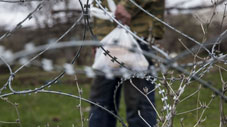
NGOs to the government: Abolish restriction on admission to surrounding villages of occupied territories.
By Khatia Bzhalava
Friday, July 31
Public organizations respond to restrictions on the access of media outlets, public society and the representatives of political parties to surrounding villages of occupied Tskhinvali/South Ossetia regions and call on the government to change the regime.
According to the information published by NGOs, the restriction which is controlled by Security Services has been active for almost a year now, since August 30th of February, 2019. The restriction even applies to the territories which are completely under the Georgian government’s supervision.
NGOs state that there have been only two occasions since February 30th, 2019, when journalists, who were escorted by the police officers, were allowed to approach the wires to cover the events. In both occurrences, journalists accompanied by police cordons were able to cover the new process of occupation with 20 meters of distance observed from the occupation line.
In other cases, despite numerous attempts of media representatives, social activists and political party members, the Security Service would not allow them to enter the villages; some of these villages are not even close to the occupation line. According to the NGOs, this practice of restriction hinders the mentioned persons from performing social activities, whilst the information about occupied territories and its surrounding villages is already limited and this barrier hinders access to information even more. “This restriction also deters examination and publication of social and legal conditions in the villages near dividing lines.”
It is noted in the organizations’ statement that journalists were rejected to approach the villages controlled by the Georgian government even with the police.
As we read in the statement, the representatives of the government justify the movement restrictions with security reasons to avoid provocations near the occupation line and to protect the safety of media representatives and social activists. However, NGOs find the government’s concerns for safety incomprehensible as there are thousands of people living in those villages.
“In a sense of safety concerns, there may be a legitimate ground for restricting freedom of movement or expression, however, restriction of these rights should be based on stringent examination and may be only implemented according to the law in case of severe social needs,” reads the statement and clarifies that in this case, legality, as well as proportionality matters of imposed restrictions, are unclear.
The organizations call on the authority to lift the restriction on the admission of media, Civil Society and politicians to surrounding villages of occupied territories and to establish approaches based on objective criteria, which will not exceed legitimate frames of restricting freedom of movement and expression.
The statement is signed by the following organizations: Human Rights Monitoring and Education Center - EMC; Georgian Young Lawyers' Association (GYLA); Human Rights Center (HRC) and Democracy Research Institute (DRI).


